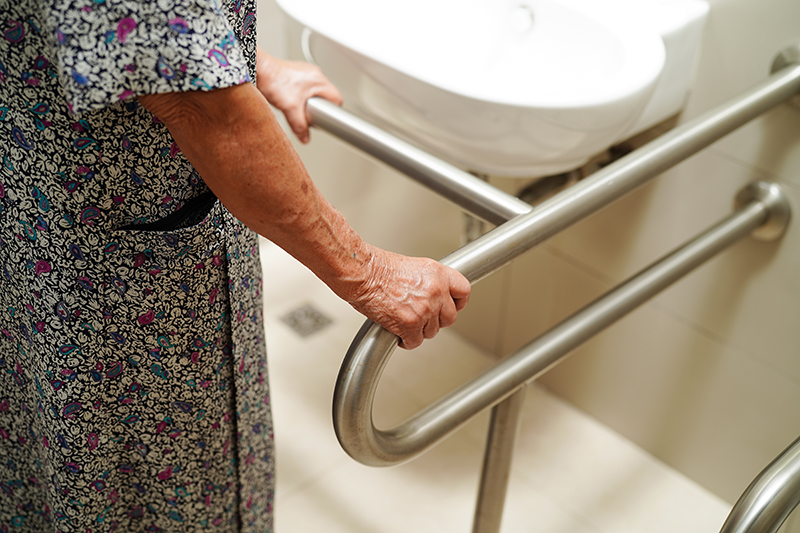10 Signs Your Loved One Needs Home Nursing Care: Knowing When to Consider Extra at Home

Learn the top 10 signs that indicate your loved one may need home nursing care. Understand when elderly care at home becomes essential and how Sisters Nursing Services can provide compassionate support.
Caring for an aging loved one requires much love, patience, and sometimes even hard decisions. As the family member grows older, their needs change frequently by ways it becomes difficult for us to satisfy all of their needs. Identifying where professional home nursing care will not only make sure that they receive the ultimate amount of care but also maintain everyone’s peace of mind. The following is a rundown of ten key signs that may indicate that your loved one is in need of home care services by a professional. Decoding these signs will help you make decisions to keep them comfortable, safe, and happy.
1. Difficulty with Daily Living Activities
With advancing age, even daily routine tasks become hard to handle.
Symptoms to look out for:
- Neglecting personal care: If one finds that a loved one has messy hair, body odor, or continuously wears dirty clothes, this might be a warning bell to show that personal care activities are being negligently dealt with.
- Trouble Dressing or Grooming: Notice unusual or suspicious clothing combinations and difficulty with buttons, zippers, and laces.
- Eating Problems: Inability to prepare a meal, difficulty in using utensils, or sudden loss of appetite are all signs of problems.
Why is this so important?
This ascertains that when daily activities become a challenge to them, it will affect their health, self-esteem, and safety.
Solution:
Professional caregivers can assist with Assistance with Daily Life, helping your loved one maintain their dignity and independence.
2. Memory Loss and Cognitive Decline
Mental health and safety are closely related.
Symptoms to look out for:
- Forgetting important dates or events: forgetting appointments with doctors, anniversaries, or gatherings intended for family.
- Repeating Questions or Stories: Often asking the same questions over and over, or telling the same stories.
- Disorientation: Confusion with places that are familiar or problem cooperating with time and place.
Why is this so important?
A memory lapse may become hazardous when one forgets to turn off the stove or wanders away from home.
Solution:
Those caregivers who experience in taking care of dementia and Alzheimer’s disease can provide support and supervision to safeguard the safety of your loved one.
3. Managing Chronic Health Conditions Becomes Overwhelming
Chronic illnesses require constant management and monitoring.
Symptoms to look out for:
- Uncontrolled symptoms refer to symptoms of chronic diseases like diabetes, hypertension, and arthritis that are not properly managed.
- Frequent Use of the Emergency Department or Hospital Admissions: If the patient is visiting the hospital or emergency department more frequently.
- Inability to Follow Through with Medical Advice: Misunderstanding about medication and/or inability to follow through on doctor’s instructions.
Why is this so important?
Poor management of chronic health conditions will lead rather quickly to more serious health problems.
Solution:
Home nursing services could make regular monitoring easier, which will help your loved one keep on track with their health.
4. Poor Nutrition and Sudden Weight Changes
The key to staying strong and healthy comes in good nutrition.
Symptoms to look out for:
- Lack of Fresh Food: An empty refrigerator or expired food could indicate that they are not shopping or preparing a meal.
- Weight Variations: The sudden gain or loss in weight may hint at malnutrition or an underlying health problem.
- Reluctance to Cook or Eat Alone: Physical limitations or just a feeling of lack of motivation to cook can be a contributing factor.

Why is this so important?
Malnutrition can weaken the body’s defense mechanisms, make one prone to infection, and aggravate current conditions that an individual may already have.
Solution:
Caregivers can also help with meal planning and preparation in order to ensure your loved one is getting regular, nutritional meals.
5. Social Isolation and Withdrawal
Social relationships are linked to mental well-being.
Symptoms to look out for:
- Loss of Interest in Hobbies: They are not taking pleasure in things they use to love.
- Social Withdrawing: They may not want to meet friends or attend gatherings.
- Symptoms of Depression Sadness, low energy, or feelings of hopelessness.
Why is this so important?
Social isolation depresses people, causes cognitive decline, and has even been linked to shorter lifespans.
Solution:
Community participation services can keep elderly people socially active. This improves their mood and confirms their mental stability.
6. Unsafe Driving and Mobility Issues
As physical abilities decline, safety concerns start piling up.
Symptoms to look out for:
- Dents or scratches on the car: Minor accidents or near misses may be the first warning signs that driving ability is declining.
- Traffic Violations: This refers to being ticketed or warned for traffic offences.
- Balance Problems: Trouble walking or standing may cause falls.
Why is this so important?
Unsafe driving puts your loved one and others at risk. Concerns with mobility create a higher risk for falls and other types of injury.
Solution:
By ensuring the arrangement of transport that is safe, along with support for mobility, it will be easier to prevent accidents and ensure your loved one is able to travel in confidence.
7. Neglecting Household Responsibilities
A well-maintained home is essential for health and safety.
Symptoms to look out for:
- Clutter/Mess: Allow clutter to build up; do not wash dishes or do laundry.
- Overdue notices or utility disruptions due to bills not paid.
- Unrepaired Home Issues: Leaky faucets, broken appliances, anything that requires repairs.
Why is this so important?
The cluttered or the accident-prone home may mirror other physical or mental health issues.
Solution:
Domestic assistance with the housekeeping aspects that keep the person’s home safe and comfortable.
8. Medication Mismanagement
Proper medication has a great bearing on health and wellness.
Symptoms to look out for:
- MedicationGratis confusion: confusing the doses or omitting.
- Expired Prescriptions: Not refilling essential medications.
- Taking Wrong Dosages: This means taking more or less than the prescribed drug.
Why is this so important?
Failure to take the medication exactly as prescribed may result in either a failure in treating the symptoms or serious life-threatening health complications.
Solution:
A professional caregiver can also manage the medication schedule, ensuring that dosages and times are accurate.

9. Physical Injuries and Frequent Falls
As our loved ones age, ensuring their physical safety becomes increasingly important. Even minor injuries can have significant impacts on their health and independence.
Symptoms to look out for:
- Bruises or Injuries: Unexplained marks may indicate recent falls or accidents that they might be hesitant to mention.
- Difficulty Rising from Seated Positions: Struggling to stand up from chairs or beds can signal weakening muscles or joint issues.
- Fear of Falling: Hesitance to move around, holding onto furniture for support, or expressing anxiety about walking alone.
Why is this so important?
These injuries can result in fractures, hospitalizations, and a decline in mobility that will impact one’s quality of life.
Solution:
Caregivers can provide transportation, and there are also some safety home modifications that can be made, such as installing grab bars and removing tripping hazards.
“For safety home modification assistance, explore this page by eldercare.acl.gov“

10. Caregiver Burnout
Caring for a loved one is a noble responsibility, but it can also be overwhelming.
Symptoms to look out for:
- Emotional Exhaustion: Feeling constantly stressed, irritable, or experiencing mood swings.
- Physical Fatigue: Persistent tiredness, sleep disturbances, or frequent illnesses due to weakened immunity.
- Neglecting Personal Needs: Sacrificing your own health, hobbies, or social life to focus entirely on caregiving.
Why is this so important?
Caregiver burnout not only affects your well-being but can also impact the quality of care you provide. It’s important to recognize your limits to prevent negative outcomes for both you and your loved one.
Solution:
Respite Care offers temporary relief, allowing you to rest, recharge, and attend to your personal needs. Professional caregivers step in to ensure your loved one continues to receive high-quality care in your absence.
When to Seek Professional Home Nursing Care
Understanding these signs empowers you to make proactive decisions.
Steps to Take:
- Open Communication: Have an open heart-to-heart talk with them and tell them what’s bothering you, in a caring way.
- See Professionals for Advice: Consult a physician, nurse, or social worker.
- Assess the care needs: if it is personally in need, medically in need, or both.
At Sisters Nursing Services, an individually focused, compassionate care plan is put in place to support your loved one through whatever may be their unique needs, from physical to emotional companionship.
How Sisters Nursing Services Can Help
At Sisters Nursing Services, we believe in promoting lives through person-centered care.
Our Service Offerings:
- Comprehensive Care Plans: Tailored to meet the unique needs of each individual.
- Qualified Caregivers: Trained professionals who provide respectful and empathetic care.
- Flexible Scheduling: Services available when you need them, including 24/7 care options.
Why Choose Us?
We prioritize collaboration, integrity, and compassion in all we do, ensuring your loved one receives the highest standard of care.
Visit our Services page to explore how we can assist you.
Getting Started with Sisters Nursing Services
If you or a loved one could benefit from domestic assistance, we’re here to help. Sisters Nursing Services is committed to enhancing comfort, independence, and well-being for NDIS participants.
- Phone: 0451 057 116
- Email: admin@sistersnursingservices.com.au
Reach out to us through our Contact Us page
Frequently Asked Questions (FAQs)
What is home nursing care?
Home nursing care involves professional healthcare services provided in the comfort of your loved one’s home. It includes medical care, assistance with daily activities, and support for chronic conditions.
How do I know if my loved one needs home nursing care?
Signs include difficulty with daily tasks, memory loss, unmanaged health conditions, and increased isolation. A professional assessment can help determine the appropriate level of care.
What services does Sisters Nursing Services offer?
We offer a range of services, including community nursing, domestic assistance, respite care, and more, all tailored to individual needs.
Learn more about our personalized approach on our Services page.
Are your services covered by the NDIS?
Yes, Sisters Nursing Services is a registered NDIS provider, and our services are designed to meet the requirements of NDIS participants.
Can care plans be customized?
Absolutely. We believe in person-centered care and work closely with families to develop plans that respect individual preferences and needs.
How do I start the process of arranging care?
Contact us via phone or email to schedule a consultation. We’ll guide you through every step to ensure a smooth transition.
Conclusion
Being aware of the signs that determine whether your loved one requires home nursing care is a thoughtful first step in ensuring his or her health, comfort, and happiness. At Sisters Nursing Services, you will find professionals who are dedicated to offering the highest standard of personalized care.




One Response
Leaving parents alone and going to work had them no one to talk to even they didn’t needed day care but I put them anyway so they don’t feel lonely.